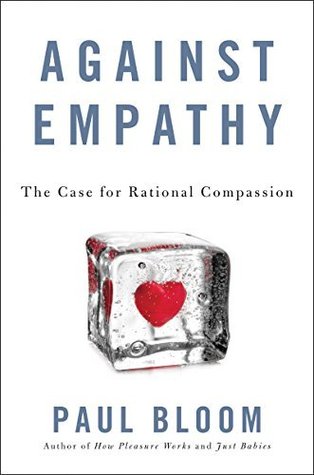More on this book
Community
Kindle Notes & Highlights
by
Paul Bloom
Read between
June 11 - July 24, 2021
But she also describes, with gratitude, another doctor who kept a reassuring distance and objectivity: “I didn’t need him to be my mother—even for a day—I only needed him to know what he was doing. . . . His calmness didn’t make me feel abandoned, it made me feel secure. . . . I wanted to look at him and see the opposite of my fear, not its echo.”
There is a world of difference, after all, between understanding the misery of the person who is talking to you because you have felt misery in the past, even though now you are calm, and understanding the misery of the person who is talking to you because you are mirroring them and feeling their misery right now. The first, which doesn’t involve empathy in any sense, just understanding, has all the advantages of the second and none of its costs.
This is a better model for what should go on in therapy—the trick, then, is not for the therapist to have empathy; it’s for the patient to have it.
Imagine that I learn that my good friend has fallen in love, and this fills my heart with joy. But it’s not because I’m feeling the giddiness and excitement of a new romance. No, I’m feeling good simply because I like my friend. Even in this mundane example, we have to be careful not to overstate the role of empathy.
Charles Dickens had an immense social conscience—but he would ridicule those who lacked special feelings for those close to them. His examples include Thomas Gradgrind, the extreme utilitarian, and Mrs. Jellyby, who we meet in a chapter of Bleak House titled “Telescopic Philanthropy”—she cares about those in faraway lands but she neglects her family: Her son has his head stuck through the railings, while she prattles on about the natives of Borrioboola-Gha.
I resonate to Dickens’s mockery. I could never take seriously people who refuse to take long flights to see those they love because of worries about contributing to climate change. Or even those who put their children into a public school that they know to be terrible even though they can easily afford a private school, just out of a broader principle of common good.
Yes, empathy is biased and parochial—but in a stupid way. Even if we decide that certain individuals are worthy of special treatment, even here empathy lets us down, because empathy is driven by immediate considerations, making us too-permissive parents and too-clingy friends.
One appeal of this view is its simplicity. To explain morality, all you need to attribute to babies is a single thing—the spark of empathy, the capacity to feel the feelings of others. Everything else follows from this spark. This is a pleasingly minimalist solution and it will appeal to those who are loath to attribute too much mental richness to such a tiny brain.
Even if empathy is foundational for children, it might be useless or even detrimental for adults. One could write a book called Against Milk, after all, while acknowledging that milk is just fine for babies.
When people remembered incidents in which they were the perpetrator, they often described the harmful act as minor and done for good reasons. When they remembered incidents in which they were the victims, they were more likely to describe the action as significant, with long-lasting effects, and motivated by some combination of irrationality and sadism.
I concede that empathy can serve as the brakes in certain cases. But I will argue here that it’s just as often the gas—empathy can be what motivates conflict in the first place. When some people think about empathy, they think about kindness. I think about war.
Some would argue that the solution is more empathy. For Israelis, then, empathy not just for their neighbors sitting in the café but for the suicide bomber who set off the bomb that maimed them. For the Palestinians, empathy not just for their brothers and sisters who had their homes crushed by tanks but for the soldiers driving the tanks.
But empathy tilts the scale too much in favor of violent action. It directs us to think about the benefits of war—avenging those who have suffered, rescuing those who are at further risk. In contrast, the costs of war are abstract and statistical, and a lot of these costs fall upon those we don’t care about and hence don’t empathize with. Once the war is under way, one can try to elicit empathy for those who have suffered, particularly those on one’s own side, because now the costs have become tangible and specific. But by then, it’s often too late.
Still, even the most robust and impressive demonstrations of unconscious or irrational processes do not in the slightest preclude the existence of conscious and rational processes. To think otherwise would be like concluding that because salt adds flavor to food, nothing else does.
Some subjects were told about an extremely generous program, others about an extremely stingy program, but this made little difference. What mattered was which party was said to support the program: Democrats approved of the Democratic program; Republicans, the Republican program. Subjects were unaware of their bias: When asked to justify their decision, they insisted that party considerations were irrelevant; they felt they were responding to the program’s objective merits.
People are not at a loss when asked why drunk driving is wrong, or why a company shouldn’t pay a woman less than a man for the same job, or why you should hold the door open for someone on crutches. We can easily justify these views by referring to fundamental concerns about harm, equity, and kindness.


